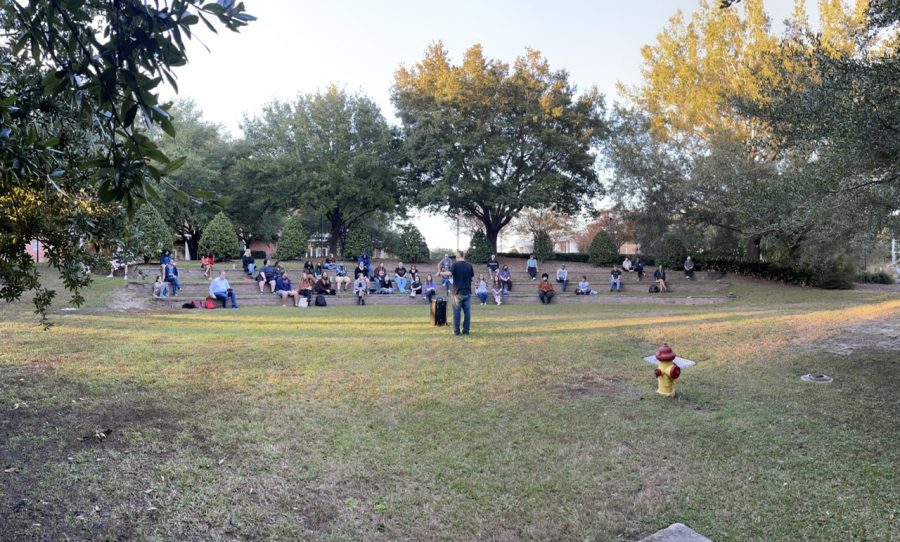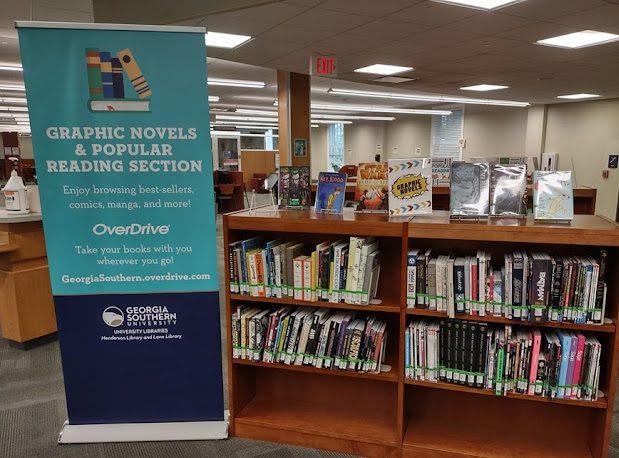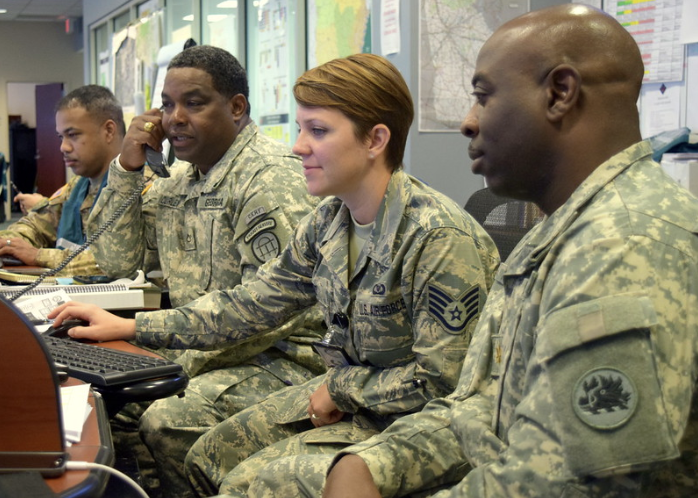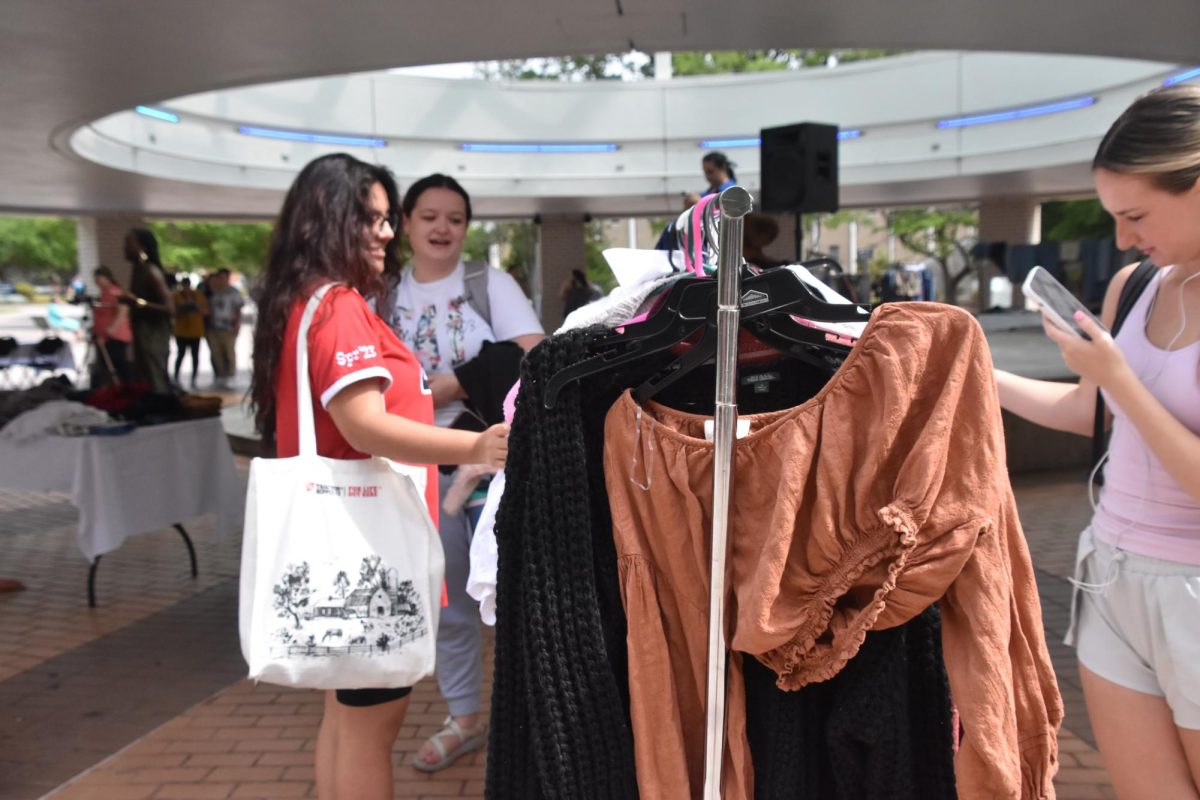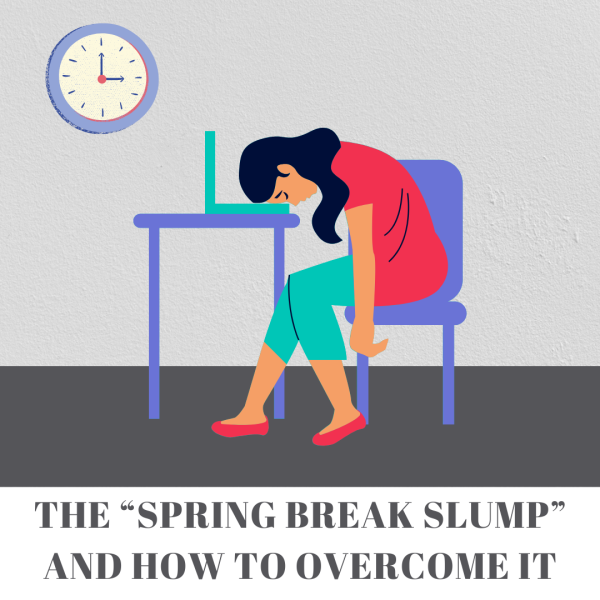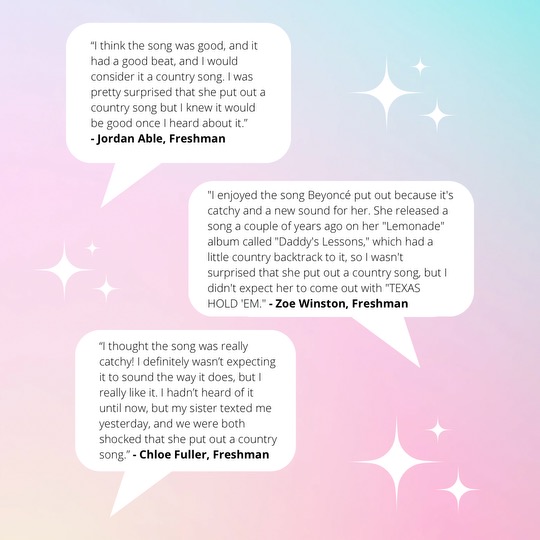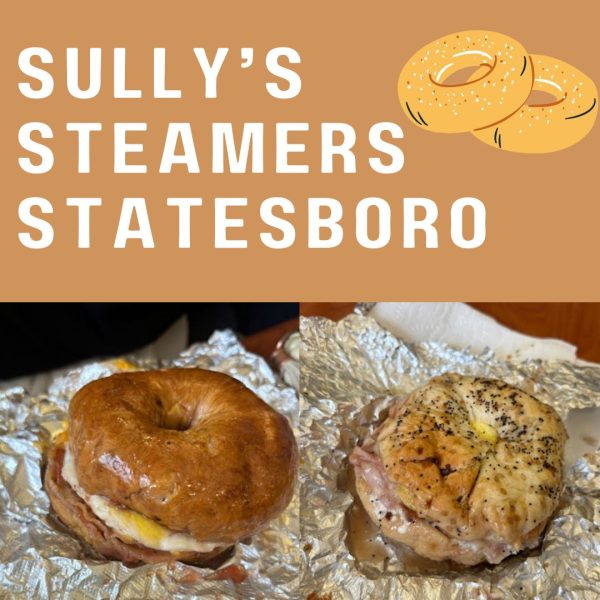Burning Swamp: The return to in-person
January 26, 2022
“There’s the family that you are born with and then there’s the family that you find. These people see you. If you found somebody who sees you, please, tell them thank you. Writing is a lonely business; this is why we do what we do.”
These were the concluding remarks of writing & linguistics professor and host, Benjamin Drevlow, regarding the first in-person Burning Swamp on Friday, Nov. 12, in almost two years.
The event began just before sunset and ended with only streetlamps to provide lighting. However, I lost track of time as I listened to the various works read aloud—as my peers shared some of their most intimate thoughts and emotions. 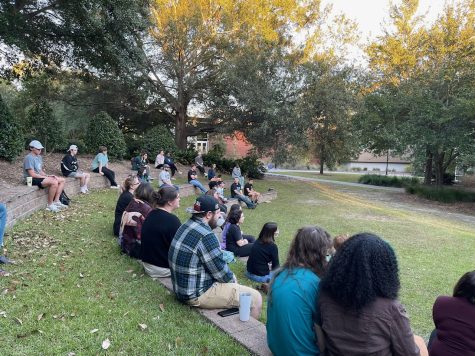
Held outside at the Newton Building amphitheater on Georgia Southern University’s Statesboro campus, Burning Swamp invited writers from the community to share their original pieces—whether poetry, short stories, or any other creative written works you wish to share.
This open-mic night—which began in 2013, was originally held at a local restaurant—Eagles Creek Brewery, on the last Tuesday of each month. Burning Swamp encouraged more than students to share their work; anyone dining out that night was invited to read.
However, following CDC COVID-19 safety recommendations, Burning Swamp transitioned from its original location to online via Zoom during spring 2020.
Burning Swamp was determined to persist during the peak of the pandemic rather than end, for poetry offers healing, comfort and many other health benefits during stressful times.
In an interview for Sincerely, Southern, Drevlow highlighted several benefits of meeting online—such as the potential to reach a much larger and further audience. Burning Swamp’s hosts and two student emcees—Brenna Salverson and Alicia Weathersby— were also determined to maintain the same energy online as produced in person.
The sign-up sheet was online and still open for anyone, as was the Zoom link. All information was (and still is) provided on the Burning Swamp Twitter page to ensure anyone who wanted access to Burning Swamp could have access.
For some, reading online was easier than in person. Since many viewers on Zoom wouldn’t have their cameras on, readers didn’t face as large and direct an audience. Still, there was a clear difference between online and in-person Burning Swamp—with the majority preferring face-to-face.
“I like [Burning Swamp] better in person. I feel like online, it wasn’t as connecting or connective… I didn’t feel comfortable reading online,” stated first-time reader, Alexis Badger, after sharing her piece.
After sharing in front of a live audience, Badger beamed, “I was scared, but I was really happy. I was pushing myself out there and preparing myself for another poetry slam.”
The audience and readers weren’t the only ones to notice the shift in the atmosphere. When I asked student emcee, Salverson, if she thought being in person compared to online made a big difference, she responded:
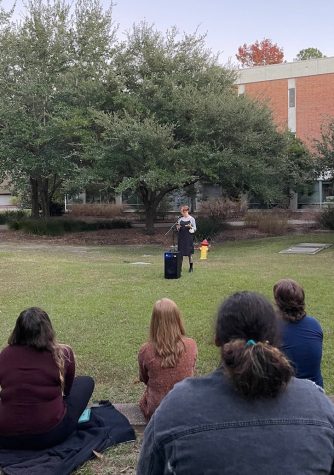 “Yes because the list [of readers] kept getting longer. That doesn’t happen online. So, I definitely think there’s just something about the atmosphere that’s like, ‘yeah, this is a community; this is a group.’ And for me, there was this moment of ‘they’re actually these amazing writers.’”
“Yes because the list [of readers] kept getting longer. That doesn’t happen online. So, I definitely think there’s just something about the atmosphere that’s like, ‘yeah, this is a community; this is a group.’ And for me, there was this moment of ‘they’re actually these amazing writers.’”
The atmosphere created by the Burning Swamp community in person was inviting and supportive. Staring into an audience of fellow writers before sharing a written piece of yourself is intimidating, especially when—like myself—you have little experience reading your work aloud for others.
However, the encouraging smiles and thunderous applause following each reader offers a feeling unlike any other. The support from both readers and viewers of Burning Swamp is overwhelming.
“I love the [in person] atmosphere, seeing all the creativity and people kind of coming together to work on things they love and they put a lot of hard work into… So many original stories and people who do things differently than I do,” regular Swamp-attendee, Julianna Tillman stated.
“It was… awesome. This was my first in-person Swamp ever,” writing & linguistics major, Alex Gholston noted after reading on Friday.
Emcee, Salverson agreed, commenting, “[Burning Swamp] was an amazing atmosphere… because you’re listening to these legends read poetry, fiction, and everything in between, and it was just amazing.”
I have attended Burning Swamp since August 2019—since Eagles Creek Brewery, through Zoom, and finally last semester’s in-person amphitheater meeting. After attending all three locations, plus reading online and in-person, my favorite venue was the Newton Building amphitheater.
While Eagle Creek Brewery offered a stage and a more diverse audience, the crowd was far more intimidating. Online, the lack of faces made it easier to face the crowd, yet more difficult to connect with one another.
On campus, however, provided a compromise between the two. Each audience member chose to attend the event with an open mind and welcoming attitude. Also, being able to hear and see the immediate reaction from listeners of your work motivates you to want to attend Burning Swamp again.
Sharing your own work with others is empowering. Writing poetry, alone, offers many benefits, but spoken word poetry—sharing your work with others— offers many more. And each writer shares their work for their own reasons.
Some students share their work simply to grow more comfortable being in front of an audience. Other students read their poetry because their message is important to spread. Sometimes, readers may want to share simply because they love to read or perform.
“It just takes one person to say they sort of connected with your work or that they enjoyed it in any way for you to keep writing. And I want to be that one person for someone else,” Gholston told me when asked why they choose to read at Burning Swamp.
For many students, Burning Swamp is an inspiration. I was a freshman writing & linguistics major when I attended my first open-mic night. I didn’t even consider sharing my own writing at the time; I was too shy and embarrassed. By the end of the night, I wished I signed up to read.
Those who performed were so confident and talented. Those sitting around me watching the readers only made positive and encouraging comments. That night, I vowed to one day read at Burning Swamp—and hopefully with the same confidence as those I listened to.
I did not read right away though; it took a year for me to overcome stage fright and read at Burning Swamp. Each event I listened as a part of the audience, building my own confidence and excitement.
When I asked Gholston about advice for those interested in Burning Swamp, they suggested, “Go to Swamp. Even if you don’t read—even if you just listen to other people stumble through their stuff or find their own confidence—it helps you model your own writing and it gives you inspiration, ideas and a really good supportive community.”
What makes Burning Swamp so special—and in-person meetings so important—is the community created. As Drevlow said in his concluding statement, Burning Swamp reminds you of the family that you choose—those with whom you surround yourself because of the love and support they give. Burning Swamp is a place to be seen—to finally be heard when it often feels like the world is not listening. Burning Swamp in person is an event in the community to make you truly feel at home.
While it is still undecided whether Burning Swamp will return to in-person on Fridays indefinitely or not, Burning Swamp will continue this semester, even if it is moved back online.

